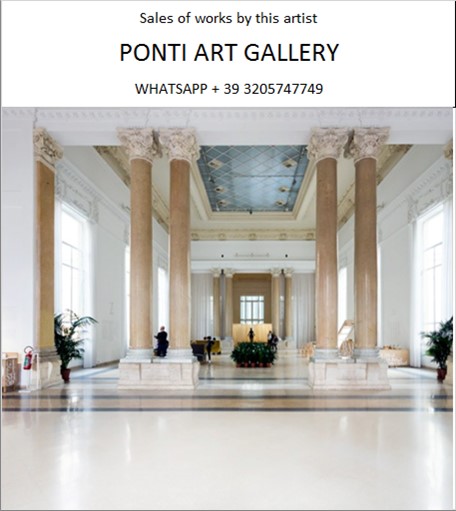Ponti Art Gallery is interested in buying and selling works
of art by this artist.

Franz Kline Biography
Franz Kline was an American painter renowned for his pivotal role in the Abstract Expressionist movement, which surged to prominence in the 1940s and 1950s. Born on May 23, 1910, in Wilkes-Barre, Pennsylvania, Kline's early life was marked by personal tragedy and a burgeoning talent for art. His father, a saloonkeeper of German descent, tragically took his own life when Kline was just seven years old. His mother, an immigrant from England, later remarried, and Kline's childhood was spent in a state of flux, moving between homes and coping with the emotional aftermath of his father's death.
Despite these early challenges, Kline's artistic abilities were evident from a young age. He was known to draw on sidewalks using the juice from rhubarb stems, and his high school years were marked by his involvement in the Art Club, his role as the cartoonist for the school newspaper, and his position as Captain of the Varsity football team. An injury during football practice led to a period of immobilization, during which Kline's interest in drawing deepened.
Kline's formal education in art began at Boston University from 1931 to 1935, where he was exposed to a range of artistic styles and techniques. He continued his studies at the Heatherley School of Fine Art in London from 1937 to 1938, which further broadened his artistic horizons. It was in London that he met his future wife, Elizabeth V. Parsons, a ballet dancer and artist's model.
In 1938, Kline moved to New York City, a decision that would prove pivotal in his development as an artist. Initially, he worked in a representational style, influenced by Cubism and social realism. However, his encounters with prominent artists such as Willem de Kooning and Jackson Pollock at the Cedar Bar, a hub for the city's avant-garde artists, would lead him to explore the possibilities of abstraction.
Kline's breakthrough came in the late 1940s when he began to experiment with large-scale, gestural, abstract paintings. His distinctive style, characterized by bold black strokes on white backgrounds, emerged from an epiphany he had after viewing his black-and-white sketches projected onto a larger scale. This technique allowed him to appreciate the dramatic impact of his compositions and led him to develop a highly personal form of Abstract Expressionism.
Kline's art was not just about the visual impact; it was also about the physical act of painting. His vigorous brushwork and the dynamic interplay between black and white were seen as embodiments of the energy and gestures created in the act of painting. His work was often likened to the industrial forms of his native Pennsylvania, the cityscapes of New York, and even the calligraphic strokes of Chinese art, although Kline himself rejected direct comparisons to traditional Japanese art.
Throughout the 1950s, Kline's reputation grew, and his work was included in major exhibitions, such as the Venice Biennale and the Museum of Modern Art's "The New American Painting" exhibition, which toured Europe. His paintings were characterized by their large scale, which imparted a sense of majesty and power, and by the late 1950s, he began to reintroduce color into his work.
Tragically, Kline's life and career were cut short when he died on May 13, 1962, in New York City, just before his fifty-second birthday. Despite his relatively short career, Kline's influence on the art world was profound. His work has been celebrated in numerous posthumous exhibitions and is held in the collections of prestigious institutions such as the Metropolitan Museum of Art, the Museum of Modern Art, and the Tate Modern.
Kline's legacy is that of an artist who, through his bold and expressive abstractions, helped to define a uniquely American movement in art. His work continues to inspire and influence artists, and his contributions to Abstract Expressionism remain a testament to his enduring impact on the world of modern art.
Franz Kline Quotes and Sales
of Works
Ponti Art Gallery selects and deals with paintings by the
artist. Upon request, we provide free estimates and
evaluations, communicate prices, quotations, and current
market values.
If you are interested in BUYING or SELLING works by the
artist, contact us immediately.
If you wish to sell or receive an evaluation of the
works:
Send us a frontal photo of the painting, one of the back,
and one of the signature. Also, indicate the dimensions of
the work. Inform us about the purchase origin of the work
and any kind of available documentation (purchase
receipts, certificates of authenticity, publications). One
of our operators will respond to you on the same day. We
guarantee maximum confidentiality and extreme
professionalism.
If you wish to purchase works by the painter: Contact us
and let us know your request. We will inform you about the
available works. We also offer the possibility to
subscribe to our NEWSLETTER, through which you will be
informed at the beginning of each month about the latest
acquisitions of the art gallery.
You can send us pictures of the work:
